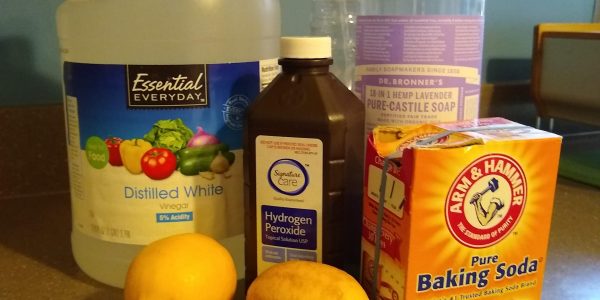Spring Cleaning – Clean Out Chemicals For Good!

This year, instead of stocking up on expensive, packaged, specific cleaners for every single thing in your home, get rid of them for good. The average person in the U.S. uses some 40 pounds of household cleaners each year, and many of those products have harmful or toxic ingredients. And the irony is that most of them time, you don’t need any of them.
I hate the cleaning aisle in most grocery stores. On the shelves you’ll find a specific product for every possible thing you can clean, and the overwhelming amount of choices kind of makes you feel like you need lots of different ones. Looking down those aisles you end up thinking you need a separate cleaner (with all its packaging, costs, storage space and chemical exposure) for every room, and often separate ones for specific appliances, areas or materials. Really, a separate cleaner for the toilet, the tub, the sink and the mirror, all in one room?
Resist the pressure, there’s an easier solution that will save money and storage space, conserve resources and prevent waste, and reduce your exposure to daily chemicals. Instead of buying toxic cleaners for each specific item, choose all natural household products to turn into almost any specific cleaner you need, mostly with the same non-toxic materials you may already have. We have 1 spray bottle with vinegar, eco-friendly dish soap, and water, and we use it for 90% of things we need to clean. Straight up vinegar works for the other 5 %, with vinegar and baking soda together making up the other 5%.
Check out our Non-Toxic Alternatives page to find great regional resources to help you reduce your exposure to chemicals. You’ll find a guide to hazardous household products, how to properly dispose of them and effective alternatives. Simple cleaning recipes (including my go to all-purpose cleaner) for a safer home, from Air Fresheners to Wood Furniture Polish. For your yard and garden you find links to great information on sustainable gardening and using less toxic alternatives in your yard to keep your yard and garden safe for people, pollinators and the planet, including a consumer guide to lawn and garden products to see how they rates in terms of toxicity.
Thanks for provide a such a great information…